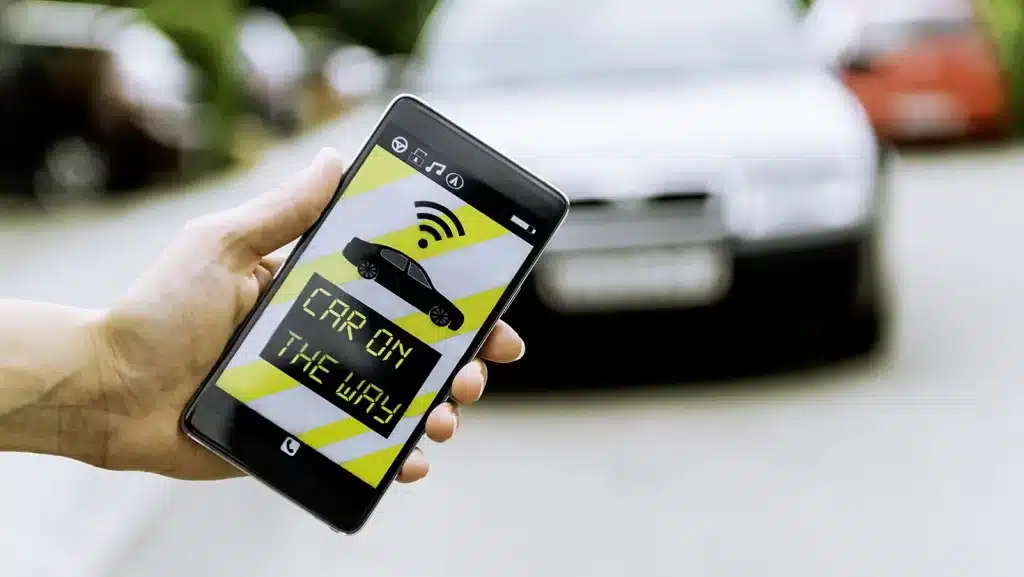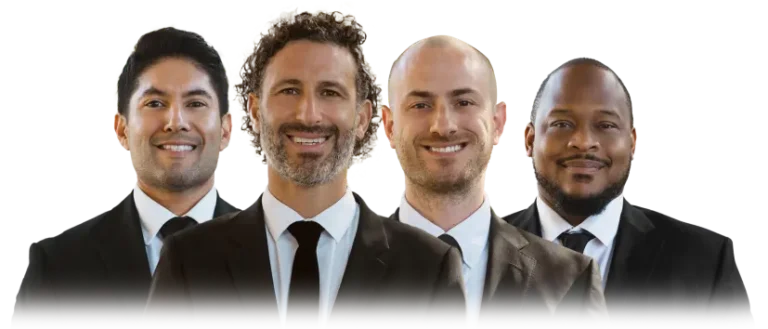Rideshare services offer convenience, but what happens when things go wrong? If you were hurt in a rideshare accident, the experienced legal team at Shamieh Law can help. Our experienced Dallas Uber and Lyft accident lawyers will work on your behalf to identify and secure the compensation you deserve. We offer free, no-obligation consultations. Schedule yours today.
Although rideshare services have become enormously popular in the past decade, accidents can still happen in many ways. Drivers or passengers of Uber or Lyft vehicles, drivers or passengers of other vehicles on the roadway, and pedestrians can all suffer serious injuries in a Dallas rideshare accident.
At Shamieh Law, we can help if you suffered injuries in an accident involving a rideshare. Our experienced Dallas car accident attorneys can help you understand your legal rights and options. There is a limited amount of time to pursue your claim, so do not wait to consult with one of our lawyers today. Contact us today to schedule your free consultation.
Our Dallas Uber and Lyft Accident Lawyers Will Fight for You
At Shamieh Law, we call our philosophy “Winning With Awareness.” This means that we treat every client, as well as everyone involved in their case, with compassion, respect, and dignity. We are not here just to win. We are also here to defend your legal rights, provide top-tier legal representation, and improve the process of working with an attorney to get the compensation you deserve.
Rideshare Case Highlight – In one case handled by our firm, a client was injured in a Lyft accident. He was left with serious spinal cord injuries and a traumatic brain injury. Our Dallas Lyft accident lawyers fought tirelessly to secure a measure of justice and accountability for him and his family. We secured $275,000 in compensation on their behalf.
When you work with Shamieh Law, we treat you like a member of our own family, and you can rest assured that we will handle your case with the highest level of care and attention. You do not need to take our word for it, as our client testimonials speak for themselves. Our many satisfied clients repeatedly praise our:
- Unyielding work ethic
- Transparent and reliable communication
- Undivided attention to their needs
- Excellent case results
Common Causes of Uber and Lyft Accidents in Dallas
Ridesharing is often celebrated for reducing accidents caused by drunk driving. A fair point, perhaps. But that does not mean ridesharing is immune from accidents—even those caused by drunk driving. The following are some common causes of Uber and Lyft accidents in Dallas:
Distracted driving – Distractions like phones, radios, GPS, food/drinks, and rowdy passengers can all raise the risk of accidents.
- Fatigue – Some Uber and Lyft drivers work long hours to increase their earnings. In many cases, they sign onto their rideshare app after finishing a full day of work at another job. The resulting fatigue raises the risk of accidents.
- Speeding – The faster your rideshare driver gets you to your destination, the faster they can pick up a new client. This can encourage speeding and increase the risk of accidents. Sadly, speeding is a leading cause of fatal accidents nationwide.
- Driving under the influence – While ridesharing may reduce the overall rate of intoxicated driving in a state, it does not eliminate the possibility of your rideshare driver operating their vehicle while intoxicated.
- External factors – Rideshare drivers are not always responsible for the accidents they are involved in. External factors, including poor weather conditions and drivers in other vehicles, can also cause a crash. In the latter case, both you and your rideshare driver may have a viable claim against the responsible driver in the other vehicle.

Compensation Available in Uber and Lyft Accident Lawsuits
After being injured in a rideshare accident, you may be struggling with overwhelming medical bills, lost wages, and property damage. You may also be dealing with stress and emotional trauma. If you successfully prove the at-fault party’s liability for your injuries, you can receive compensation for things like:
- The cost of past and future medical expenses, including:
- Doctor’s appointments
- Hospitalizations
- Medications
- Physical therapy
- The cost of long-term care and support, such as:
- Home health services
- Mobility devices
- Accessibility upgrades to your home or vehicle
- Lost wages and lowered future earning capacity if your injuries impact your ability to work.
- Physical pain and suffering
- Emotional distress
Dallas Uber and Lyft Rideshare Users Are Protected Under Texas Law
In 2017, the Texas state legislature passed House Bill 100, establishing statewide regulations, operating standards, and insurance requirements for rideshare companies operating in the state. The law also prevents counties and municipalities from passing contravening regulations within their jurisdiction.
Broadly speaking, the law aims to protect Texans and sets requirements for rideshare drivers and companies operating within the state. For example, rideshare drivers in the state must:
- Perform an annual criminal background check to ensure zero criminal convictions in the previous three years,
- Carry auto insurance,
- Not be on a sex offender registry,
- Not have more than three moving violations, and
- Not have been convicted of a DWI in the previous seven years.
Rideshare companies operating in Texas must also adhere to certain requirements, including:
- Maintaining records of all rides for at least five years,
- Providing an electronic receipt to customers,
- Obtaining a permit to operate services,
- Maintaining proof of registration and auto insurance for each vehicle used, and
- Providing the option to request a wheelchair-accessible vehicle.
Are Uber or Lyft Required to Provide Insurance for their Drivers?
Yes. In Texas, rideshare companies are legally responsible for maintaining insurance for their drivers, as outlined in the Texas Insurance Code and the table below:
Texas Insurance Code, Rideshare Insurance Requirements
Between Rides
When a rideshare driver is logged on to their rideshare app and waiting for ride requests, their company must provide:
- 1. $50,000 for bodily injury to or death for each person in an incident,
- 2. $100,000 for bodily injury to or death of a person per incident,
- 3. $25,000 for damage to or destruction of property of others in an incident,
- 4. Uninsured or underinsured motorist coverage, and
- 5. Personal injury protection coverage.
During Rides
When a rideshare driver is engaged in a prearranged ride, their company must provide, at a minimum:
- 1. Coverage with a limit of liability of $1 million for death, bodily injury, and property damage for each incident;
- 2. Uninsured or underinsured motorist coverage; and
- 3. Personal injury protection coverage.
Common Injuries Sustained in Dallas Uber and Lyft Accidents
Rideshare accidents, like any other auto accident, can result in a wide variety of injuries. Some are minor. Some are fatal. Below are some common injuries we see when handling rideshare accident cases:
- Broken and fractured bones
- Traumatic brain injuries (TBIs)
- Spinal cord injuries (SCIs), including full or partial paralysis
- Scars, disfigurement, and amputation
- Shoulder injuries, such as rotator cuff tears
- Sprains, strains, bruises
- Lacerations and puncture wounds
- Burn injuries
- Back and neck injuries, such as herniated discs and whiplash
- Nerve damage
- Internal bleeding and organ damage
- Psychological trauma, such as anxiety, depression, and PTSD
In worst-case scenarios, rideshare accidents can result in wrongful death. If you lost a loved one in an accident involving Uber, Lyft, or another rideshare company, our Dallas rideshare accident lawyers can help you file a wrongful death lawsuit against the responsible party.
What Is the Statute of Limitations for Uber and Lyft Accidents?
All personal injury cases are governed by a statute of limitations, which sets a deadline after which injury victims can no longer file their claim seeking compensation from at-fault parties. Subject to very limited exceptions, missing the deadline results in your case being dismissed in court.
In Texas, the deadline for car accident cases, including those involving rideshare companies like Uber and Lyft, is normally two years from the date of injury or death. Our Dallas Uber and Lyft accident lawyers can verify your statute of limitations and identify potential exceptions.
Steps to Take After an Uber or Lyft Accident in Dallas
Being injured in a car accident, including those involving Uber or Lyft drivers, can be an extremely disorienting experience. The steps you take in the immediate aftermath of an accident can make a huge difference down the road when you file a case seeking compensation for your injuries and losses.
Where possible, take the following steps to protect your well-being and right to compensation after being injured in a rideshare accident:
- Seek medical attention – In any accident, your safety is the most important consideration. Therefore, do not wait to seek medical attention. Remember also that many injuries, such as whiplash and concussions, may take a few days to become apparent. Seeking medical attention early on will ensure that all your injuries are treated and documented in your medical records, which will be used to calculate your compensation.
- Report the accident – The first thing you should do is report the accident. When the police arrive at the scene, they will prepare an accident report. Because of its perceived objectivity, this document will carry great evidentiary weight in your case.
- Gather contact information – Collect the following information from all drivers involved in the accident: their name, address, license plate number, driver’s license number, and insurance policy number. If there were any witnesses to the accident, gather their names and contact information as well.
- Preserve evidence – The scene of the accident is the best place to gather evidence while it is still fresh. Doing so can turn the tide of your case. Take photos and videos of the scene, including street signs, skid marks, vehicles involved in the crash, nearby surveillance equipment, evidence of intoxication, and any other significant details that may help build your claim.
- Beware of at-fault insurers – If you receive a call from a rideshare insurer, do not discuss your injuries or details of the accident. Why? Because anything you say to them can be used to diminish the value of your claim or deny it altogether. You have no legal duty to speak to them without your attorney. Do not give up your right to silence.
- Beware of your own insurer – Cooperate with your own insurance company, as failure to cooperate will likely violate the terms of your insurance policy and risk losing your coverage. However, cooperation does not mean losing sight of the fact that even your own insurer does not have your best interests at heart. Like any insurer, they will try to save money by finding as many reasons as they can to deny your claim.
- Avoid social media – Insurance adjusters often scrutinize public posts in search of anything they can use to deny your claim. Therefore, it is best to exercise some discretion until after your case is resolved.
- Consult with an attorney – Contact Shamieh Law before signing any releases or accepting early settlement offers from insurers responsible for compensating you. Early offers nearly always undervalue your claim, especially if the adjusters know you have not yet consulted with an attorney.
The Dallas Uber and Lyft Accident Lawyers at Shamieh Law Can Help
If you were injured in a Dallas rideshare accident, do not wait to consult with an experienced attorney. The rideshare accident lawyers at Shamieh Law are ready to stand up to big companies like Uber and Lyft. We have what it takes to handle your case from start to finish, and you can count on us to stand by you every step of the way toward full and fair compensation.
We offer free, no-obligation consultations, which means there is no downside to having your case reviewed by one of our Uber and Lyft accident lawyers in Dallas. Let us make sure you understand your full legal rights and options. Contact us to schedule your consultation today.
- Dallas Car Accidents
- Dallas Truck Accidents
- Dallas Motorcycle Accidents
- Dallas Pedestrian Accidents
- Dallas Bus Accidents
- Dallas Train Accidents
- Dallas Slip and Fall Accidents
- Dallas Dog Bite Lawyer
- Dallas Workplace Accidents
- Dallas Construction Accidents
- Dallas Industrial Accidents
- Dallas Product Liability
- Dallas Wrongful Death Accidents






